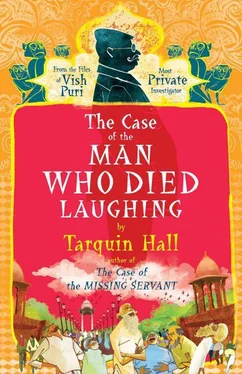Tarquin Hall
The Case of the Man Who Died Laughing
Ensconced on the backseat of his Ambassador with the windows rolled up and the air-conditioning working full blast, Vish Puri kept a wary eye on the crack in the car’s windscreen. It had started off as a chink – the work of a loose stone shot from the wheels of a speeding truck on Mathura Road that afternoon. But despite the sticky tape fixed to the glass like a bandage, the fissure was beginning to spread.
Delhi’s infernal heat pressed down on the windscreen, trying to exploit its weakness, determined to conquer the defiant pocket of cool air within. The detective imagined what it must feel like to be a deep-sea explorer, listening to your tiny craft creaking under thousands of tons of pressure.
That Monday in early June, the top temperature in the capital had been 44 Celsius, or 111 Fahrenheit – so hot, the tarmac on the roads had grown pliable and sticky like licorice. So hot that even now, an hour after darkness had fallen, the air felt like fire in the lungs.
Nothing dampened the frenetic spirit of Delhi’s rush hour, however. Everywhere Puri looked, thousands upon thousands of people were making their way through the heat, the roar of the traffic, and the belching fumes illuminated in the headlights. Laborers, servants, and students crowded into non-air-conditioned buses; bicyclists in sweat-soaked shirts strained against their pedals; families of three, four, even five rode on scooters, mothers sitting sidesaddle, infants in their laps and older children sandwiched in between.
And everywhere commerce flourished. Chunks of ice-cooled coconut and bootleg copies of Booker Prize novels were being sold by children meandering through the crawling traffic. Watermelons were heaped on the pavements. Handbills advertising the powers of a hakim [1] For a glossary of unfamiliar terms, see page Glossary.
, who promised to exorcise malignant spirits and counteract curses, were being slipped under windshield wipers.
As Puri watched countless faces slick and shiny with sweat, eyes blinking in the pollution, lips parched with thirst, he was struck by how stoically ‘Dilli wallahs’, as Delhiites were known, went about their lives, seemingly resigned to the capital’s harsh and, for most, worsening conditions. Part of him admired their resilience, their surprising good humor in the face of such grinding adversity; but he also mourned humanity’s capacity to adjust to any conditions and perceive them as normal.
“The survival instinct is both blessing and curse, also,” was how he put it.
For his part, the detective had grown accustomed to air-conditioning. Without it, dressed in his trademark safari suits and Sandown caps, he fared badly. At the height of summer, he stayed inside as much as possible. When venturing out was unavoidable, Handbrake, his driver, had to walk next to him with an umbrella to ensure that his employer remained in the shade. Puri had also invested in a small battery-powered hand fan. But in temperatures like these it had the opposite effect for which it was intended – like putting your face in front of an exhaust vent.
He could only pray that the windscreen would hold. Tomorrow was the earliest he could afford to send Handbrake to get it replaced.
It was going to be a long night.
Puri glanced at his watch. Ten minutes to eight – ten minutes until the drop was due to be made at Fun ‘N’ Food Village.
“Subject is approaching IGI overbridge, over,” he said into his walkie-talkie.
The silver Safari he was tailing left the gated colonies and posh villas of South Delhi and headed onto the new, elevated three-lane expressway that snaked past Indira Gandhi International Airport.
“In position, Boss,” came back a voice. It belonged to one of Most Private Investigators’s top undercover operatives. Puri, who was in the habit of giving nicknames to people, called him Tubelight because he was usually ‘slow to flicker on’ in the morning.
“Tip-top,” replied the detective. “Should be we’re with you shortly. If only this bloody fellow will get a move on. By God, such a slow coach!”
From the moment they’d started to tail the Safari, the detective had watched its slow progress with incredulity. Unlike all the other cars, which treated the road like a Formula One racetrack, slaloming through the lumbering heavy-goods vehicles and diesel-belching buses, it had kept precisely to the speed limit. It was the only vehicle on the road that didn’t straddle two lanes at once and have its headlights on full beam. And its horn remained silent despite the instructions painted on the backs of the trucks, HORN OK PLEASE!
“Arrrrey!” exclaimed Puri in frustration as the Safari gave way to a lowly auto rickshaw. “I’m all for sensible driving – speed thrills but kills, after all. But this man is some sort of joker, no?”
Handbrake was equally bewildered: “Where did he learn to drive, sir?” he asked in Hindi. “Ladies’ college?”
“No, United States,” the detective answered with a laugh.
In fact, Shanmuga Sundaram Rathinasabapathy, Most Private Investigators Ltd.’s latest client, had got his license in Raleigh, North Carolina.
According to Rathinasabapathy’s dossier – Puri had managed to get hold of a copy from one of his military academy batchmates who was now working in Indian intelligence – ‘Sam’ Rathinasabapathy was the son of a Tamil heart surgeon who had been born and brought up in the Tar Heel State. A nuclear physicist and MIT graduate, he had ‘returned’ to India a month ago, bringing with him his fellow ‘non-resident Indian’ (NRI) wife and two young children. He was meant to be working for a joint American-Indian partnership building a new generation of nuclear reactors but had so far spent all his time dealing with problems and corrupt practices as he had tried to rent an apartment, enroll his children in school and find his way around the city.
Three days ago, facing a crisis, Sam Rathinasabapathy had come to see Puri in his Khan Market office and outlined his predicament.
“This is my children we’re talking about! What am I going to do? I’m absolutely desperate!”
The detective had agreed to help him, advising the earnest, clean-cut Rathinasabapathy to play along with the demands of the middleman who had contacted him.
“Pay this bloody goonda the two lakhs and leave the rest to me,” was how he’d put it.
After that first meeting, Puri had marveled to his private secretary, Elizabeth Rani, about the naivete of “these NRI types.” More and more of them were being posted to India by top financial institutions and multinationals. Like the Britishers before them, the majority lived in pampered luxury, spent a good deal of their time complaining about their servants and Delhi belly, and didn’t have the first clue about how things were done in India.
“A topper this Sam fellow might be, but here in India he is quite at sea,” the detective had said. “What is required in this situation is experience and aptitude. Fortunately, Vish Puri can easily and willingly supply both.”
Having bestowed on his new client the sobriquet Coconut – “The fellow might be brown on the outside but he is one hundred ten percent gora inside” – the detective had put his plan into action.
That afternoon, Sam Rathinasabapathy had withdrawn the two hundred thousand rupees demanded – a hundred K for each of his children – from the bank. He had brought the cash to Most Private Investigators Ltd., where Puri had made a note of the serial numbers and packed the wads of notes in a brown duffel bag.
The call from the middleman explaining where to make the drop had come at six o’clock. This had given Tubelight enough time to get to Fun ‘N’ Food Village first and move into position.
Читать дальше












